PSYC 2530: Intelligence testing
A short history of early cognitive testing
Matthew J. C. Crump
Last compiled 09/21/22
Reminders from last class
Reading for today was chapter 4 Intelligence testing from the textbook.
Roadmap
1 The intelligence test race
2 Binet-Simon Test
3 Mental testing and Eugenics
4 Critical responses
What is intelligence?
Everyone knows what that means

Hmmm, the more I think about it…

Questions to consider
- What is intelligence?
- What are intelligence tests and what do they measure?
- How have these tests been used in society?
- Reasonable people have diverging opinions about the above questions
- This class explores the historical context and development of IQ tests
The intelligence test race
The eugenics movement desired “scientific” tests that could convincingly measure individual differences in mental ability
A eugenics goal was to develop mental tests, test whole segments of society, then deploy positive and negative eugenic social policies on people depending on their test results
Psychologists committed to the eugenics movement “raced” to develop suitable mental tests during the turn of the century
Turn of the century (1900)
Psychologists around the world are developing tests to measure people on numerous dimensions (mental, physical, health, etc.)
National governments (UK, Germany, France, USA) are beginning to use, or consider using tests in conjunction with social policy and decision-making.
James Mckeen Cattell (1860-1944)
Founding Editor of Psychological Review (1894)
APA president (1895)
Bought the journal Science, edited it for many years
Removed from position at Columbia for expressing opposition to American involvement in World War I
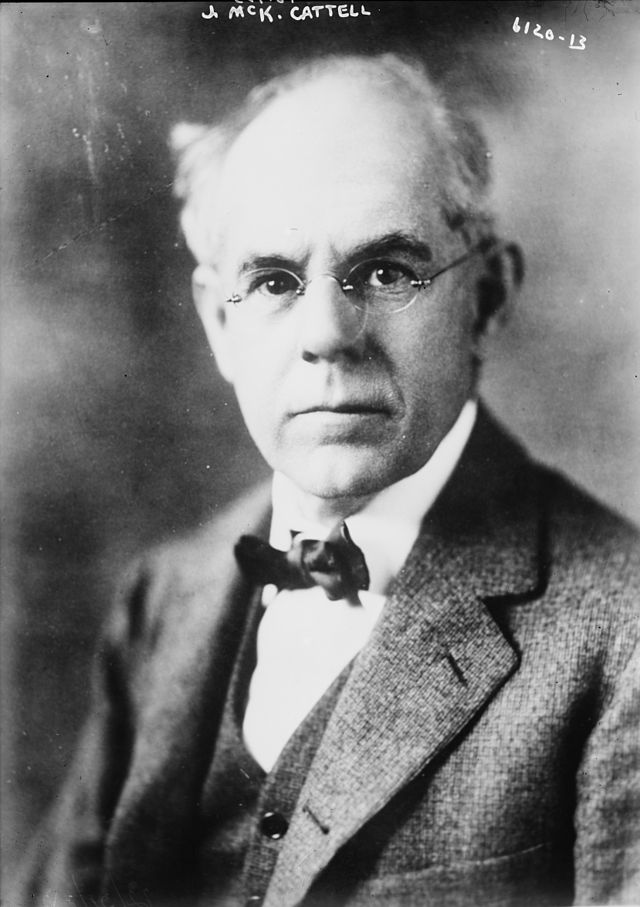
Cattell as Galton’s acolyte
Cattell visited Galton in the UK and popularized Galton’s psychological and eugenics mission in the USA
Conducted research in the style of Galton, motivated by eugenics
Attempted to develop mental tests to measure individual differences in human quality
Men of science
Galton and Cattell both tried to demonstrate that “men of science” in England and the US had inherited superior traits
Galton
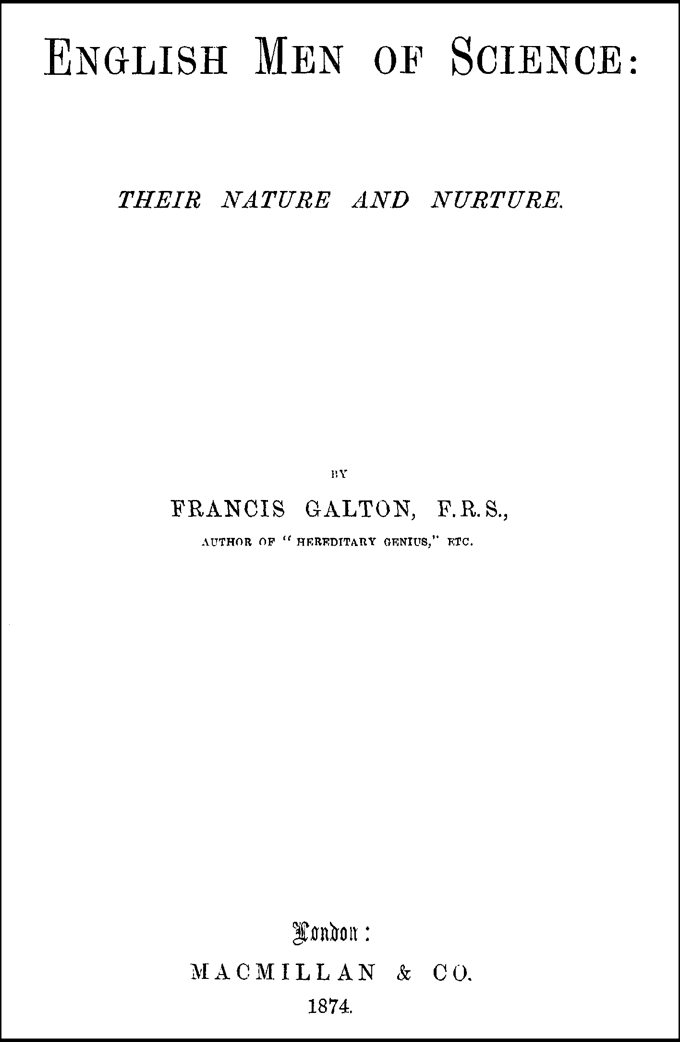
Cattell
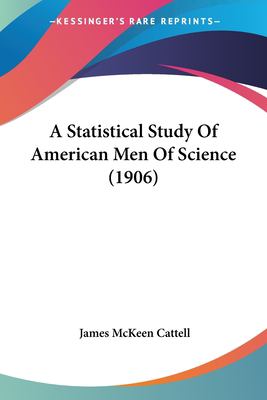
Cattell’s mental tests
CATTELL, J. McK. (1890). V.—MENTAL TESTS AND MEASUREMENTS. Mind, os-XV(59), 373–381. https://doi.org/10/dhn9nc
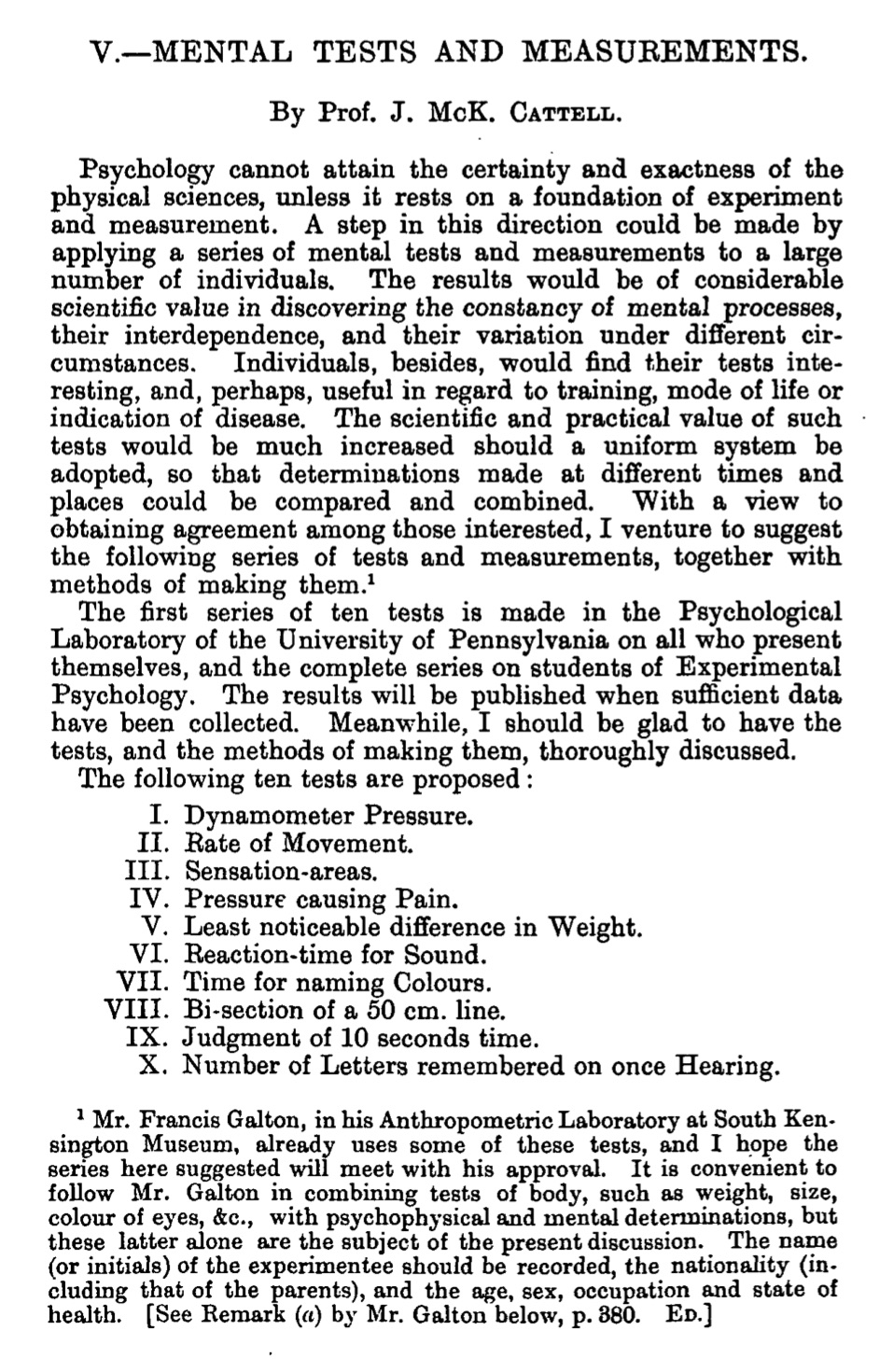
Testing Columbia students
Cattell, J. M., & Farrand, L. (1896). Physical and mental measurements of the students of Columbia University. Psychological Review, 3(6), 618. https://doi.org/10/ckms9q
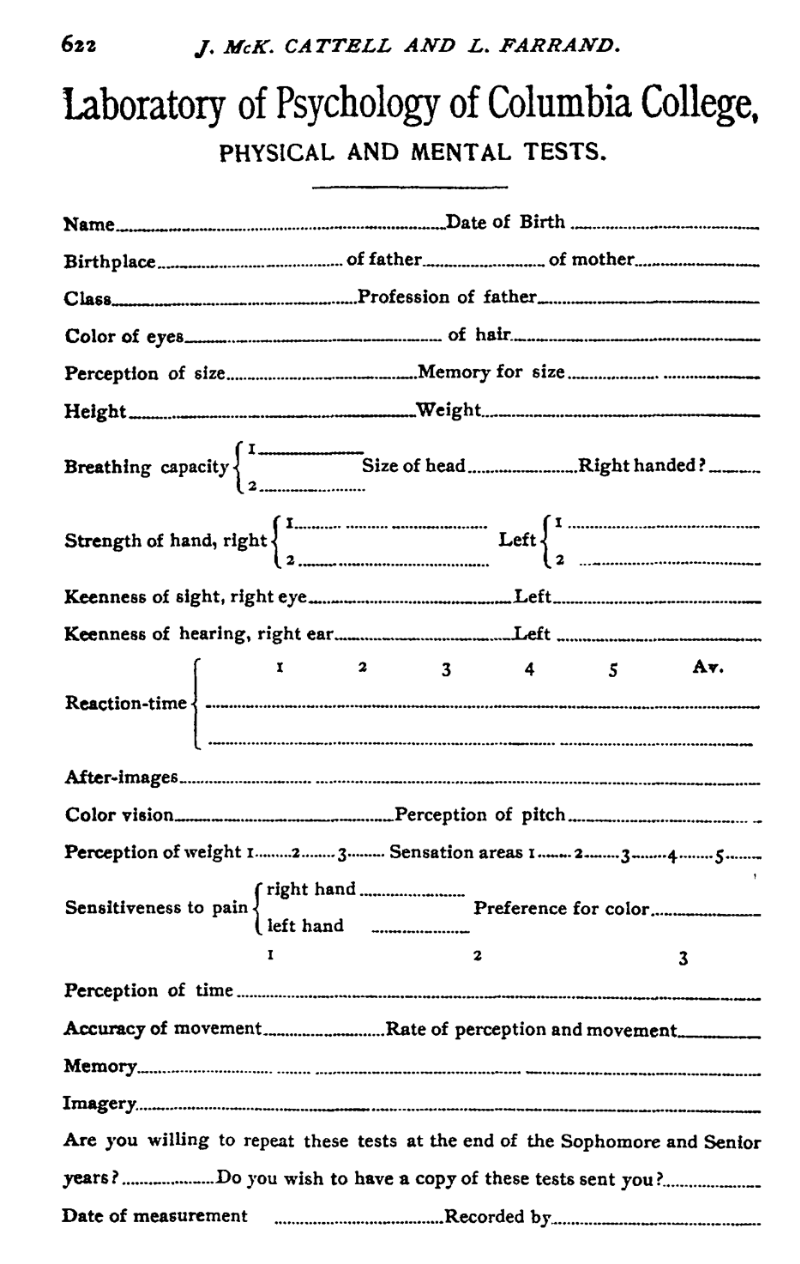
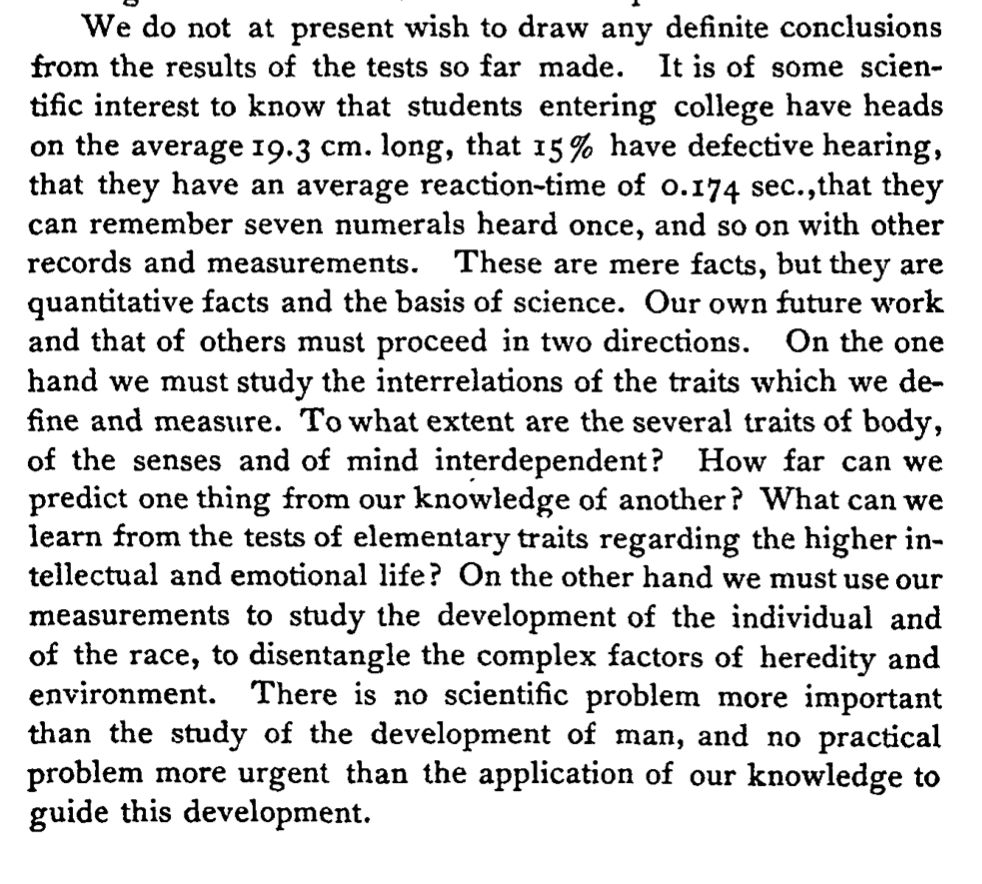
Cattell’s tests weren’t predictive
Efforts to predict Columbia students grades (a potential measure of their intelligence) from Cattell’s tests were not successful.
Binet’s Critiques
As mentioned previously, several other psychologists around the world were attempting to develop their own versions of mental tests
Alfred Binet was a French Psychologist who critiqued Cattell’s tests for lacking face-validity
Binet argued that Cattell’s tests weren’t very mentally challenging…
Roadmap
1 The intelligence test race
2 Binet-Simon Test
3 Mental testing and Eugenics
4 Critical responses
Binet’s Motivation
The French government was already enacting social policies to institutionalize “unfit” children
Children were being sent away on the basis of subjective judgments from teachers and parents.
Binet thought objective mental tests would allow for a more rational decision-policy that could be used to optimize the process.
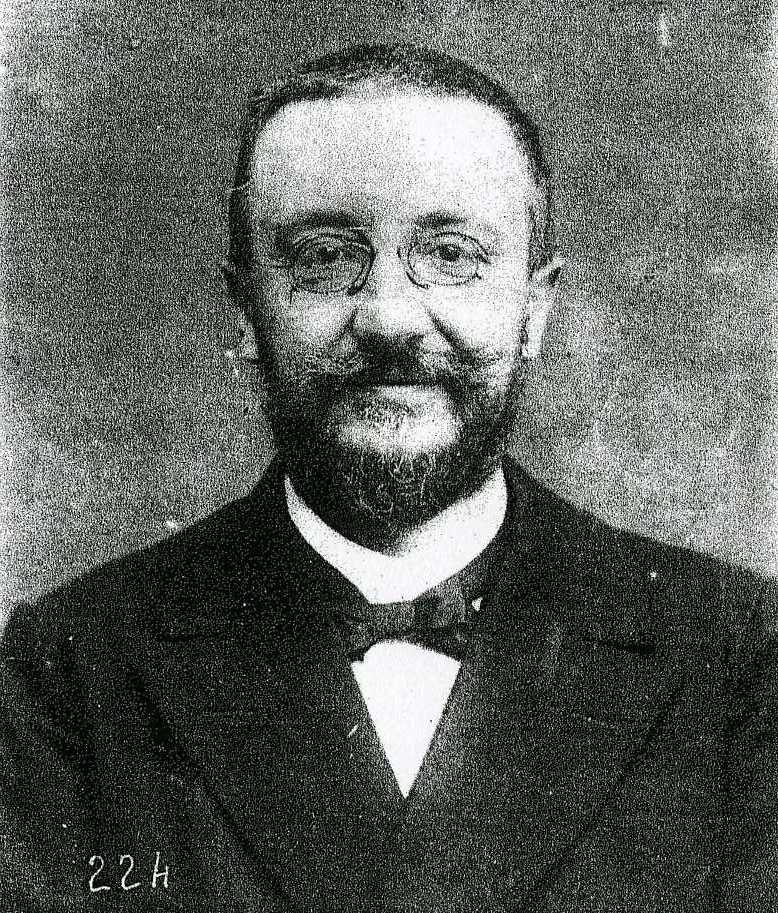
Translated to English in 1916
Kite, E. S. (1916). The development of intelligence in children (The Binet-Simon Scale). Williams & Wilkins Company.
You can read it all here
Binet’s testing method
Binet created a variety of puzzle-like tasks
Chose tasks that he thought required mental processing
Systematically measured how children of different ages perform on each task
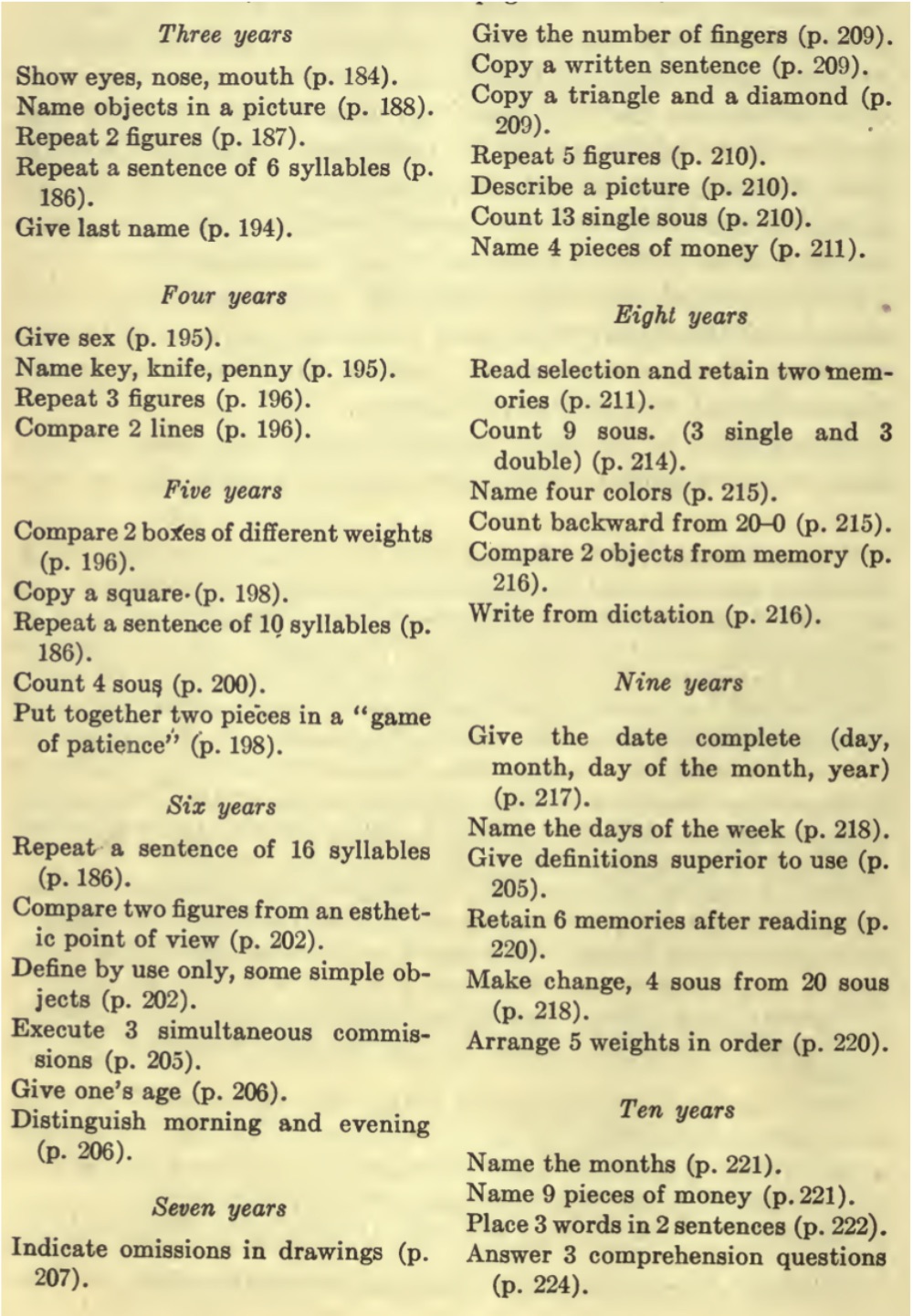
Basic Results 1

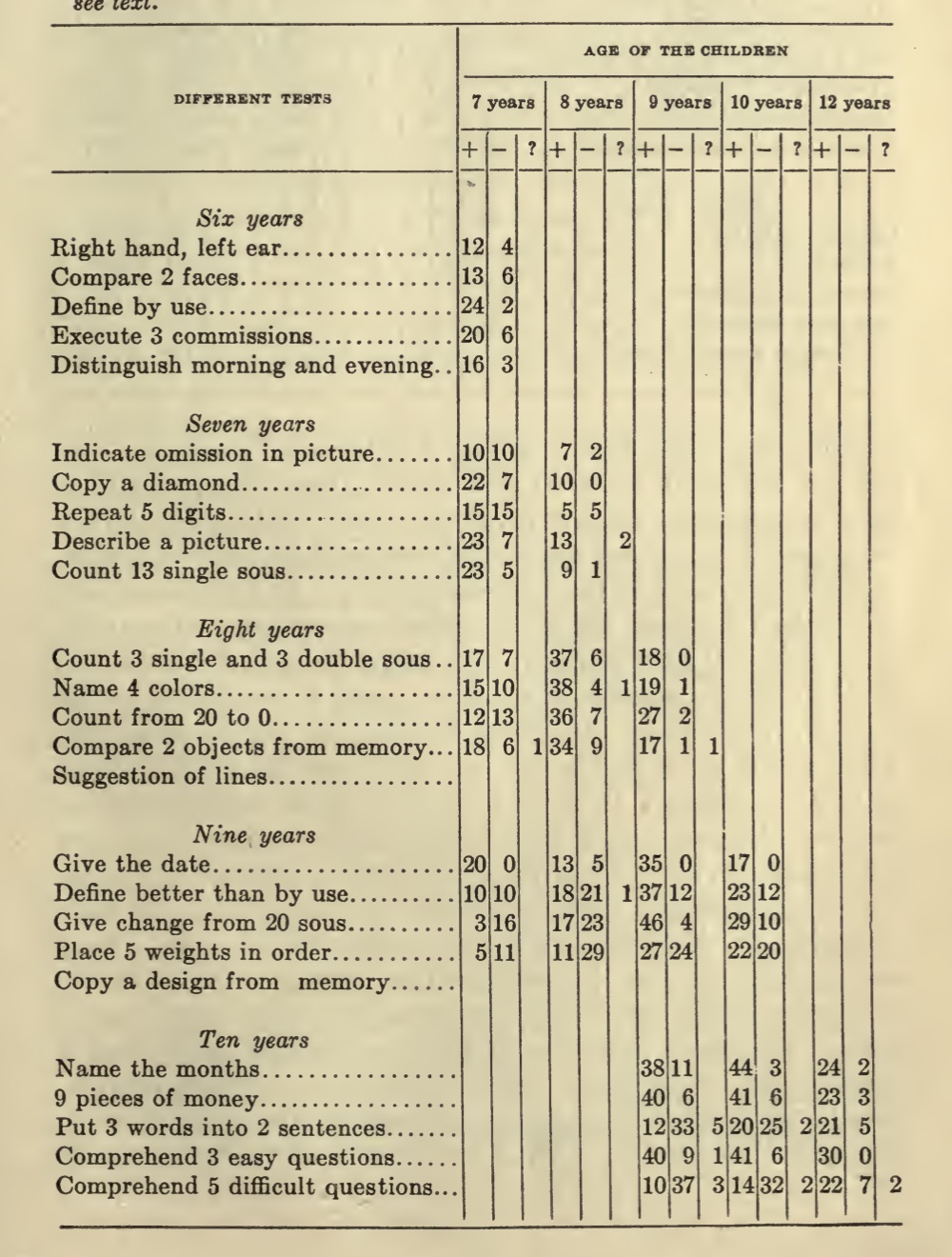
Quantification problem
Binet had a large number of results from many children on many tests
And, he recognized that “intelligence” was a complex, multi-dimensional, fuzzy concept
He sought a method to distill his measurements into a convenient and simple scale…his solution was mental age.
Equating mental ability with Age
Age was simple like a ruler, going up in increments of one year at a time.
Children develop physically and mentally as they grow, and this development is reflected in their age
Binet assumed that mental abilities steadily increased every year until adulthood.
Linking Age to mini-test results
One test signifies nothing, let us emphatically repeat, but five or six tests signify something. And that is so true that one might almost say, ‘It matters very little what the tests are so long as they are numerous.’ - Binet
No single mini-test indicates anything about your “mental age”…
Norm-based comparison
Binet’s measurements had meaning through comparison to empirical norms.
Empirical norms are existing measurements of how other children performed on the test
The large empirical database allowed Binet to assess how anyone performs the mini-tests compared to the groups of children he measured.
Algorithms for computing mental age
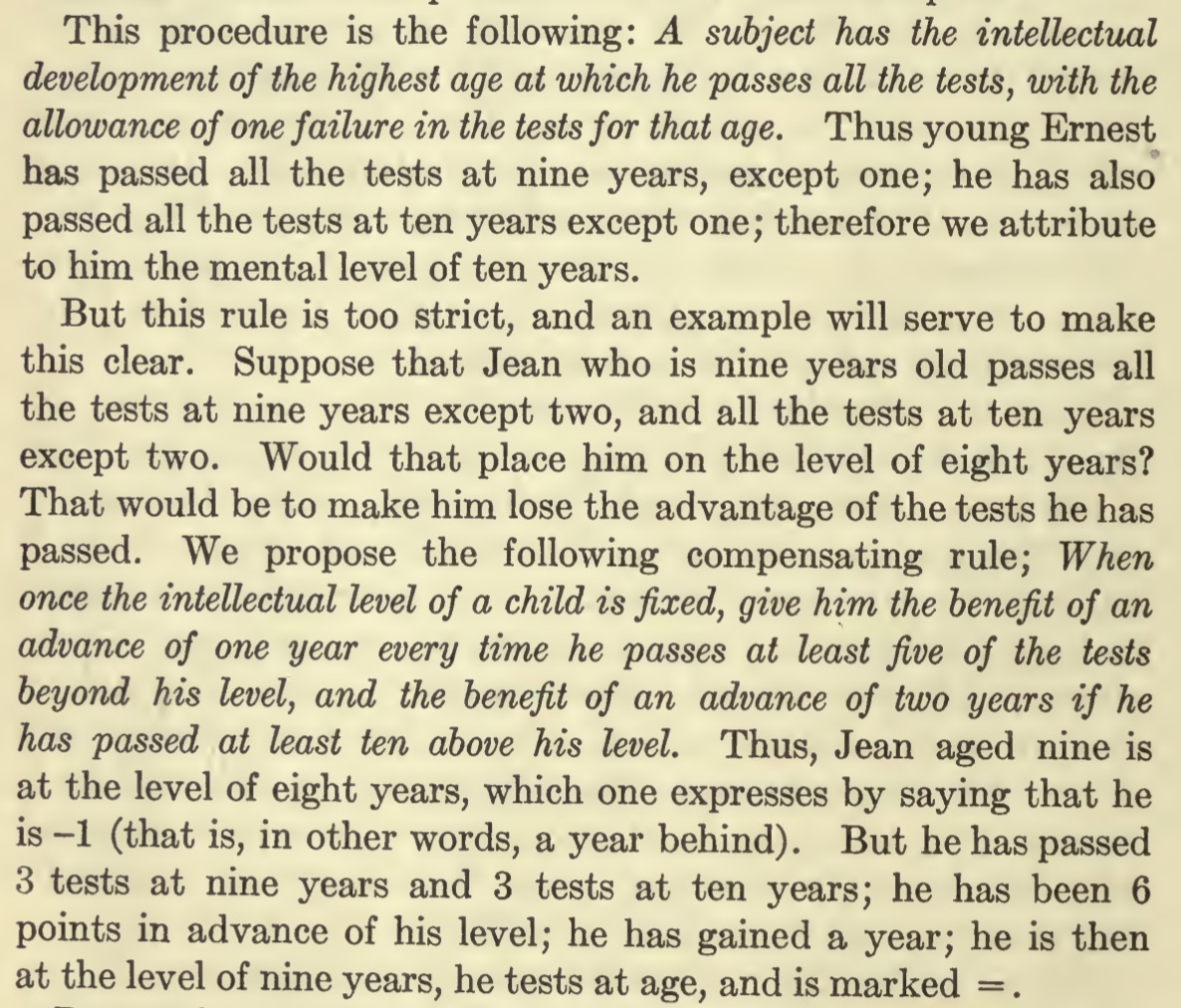
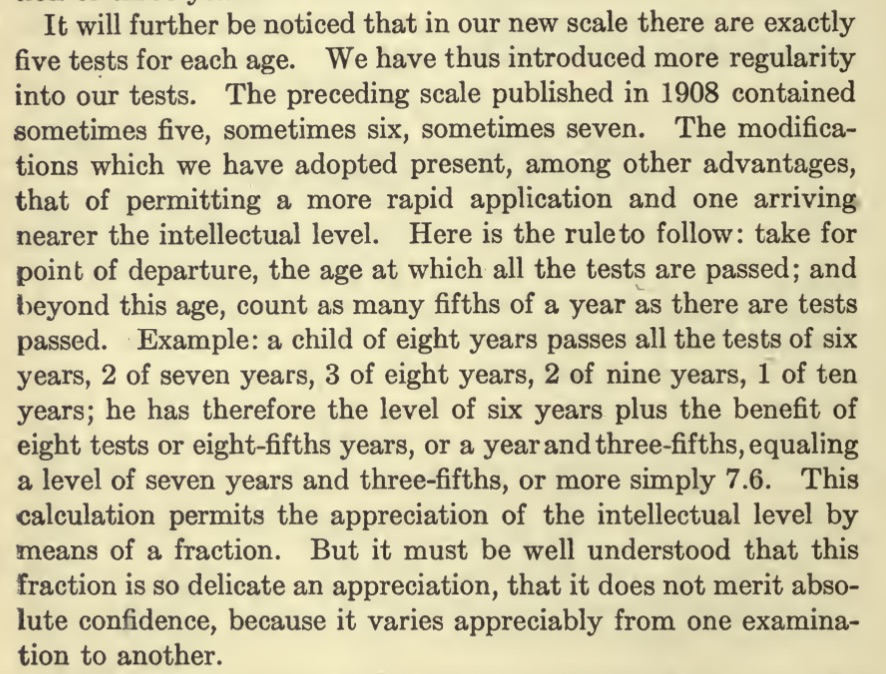
Correlating mental age with school performance
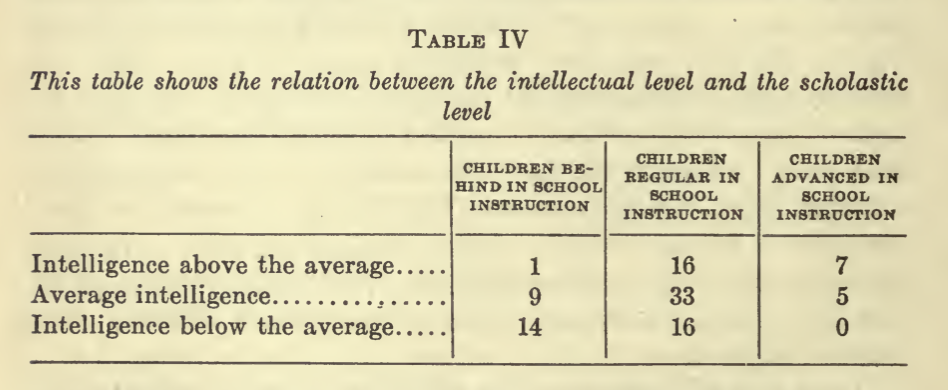
Meaning of modern IQ?
Binet’s scale was in “mental” years
Modern “intelligence tests” use a standardized scale, often termed IQ or intelligence quotient
Binet died in 1911, and his strategy for mental testing was quickly adopted by American psychologists for the purposes of the eugenics movement.
Roadmap
1 The intelligence test race
2 Binet-Simon Test
3 Mental testing and Eugenics
4 Critical responses
Human Betterment Foundation
Human Betterment Foundation was an American Eugenics organization on the west coast
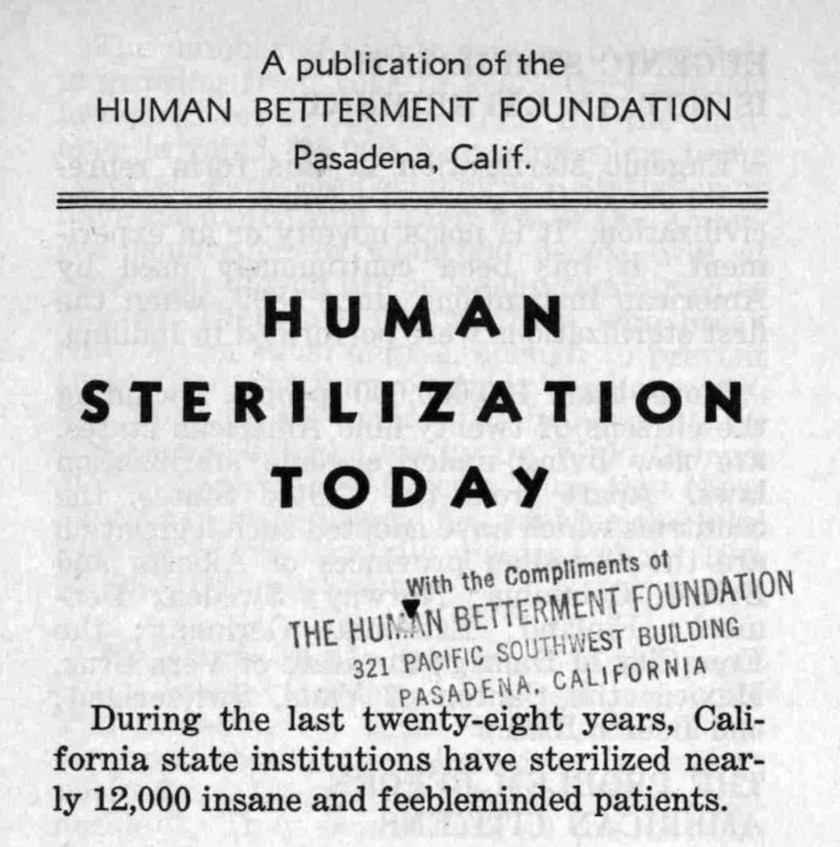
Member List
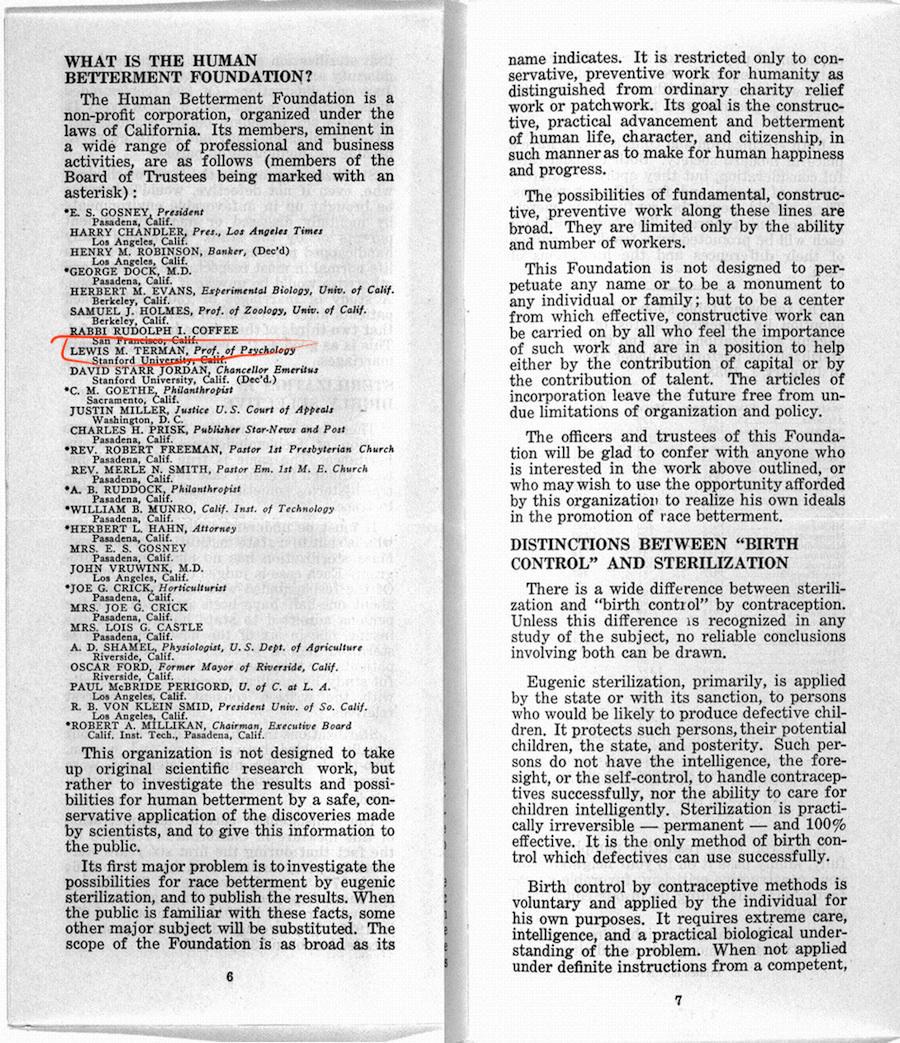
Lewis Terman
American Psychologist (1877-1956) at Stanford University
APA president (1923)
Eugenics leader and advocate
Popularized Binet-Simon test in USA as Stanford-Binet test
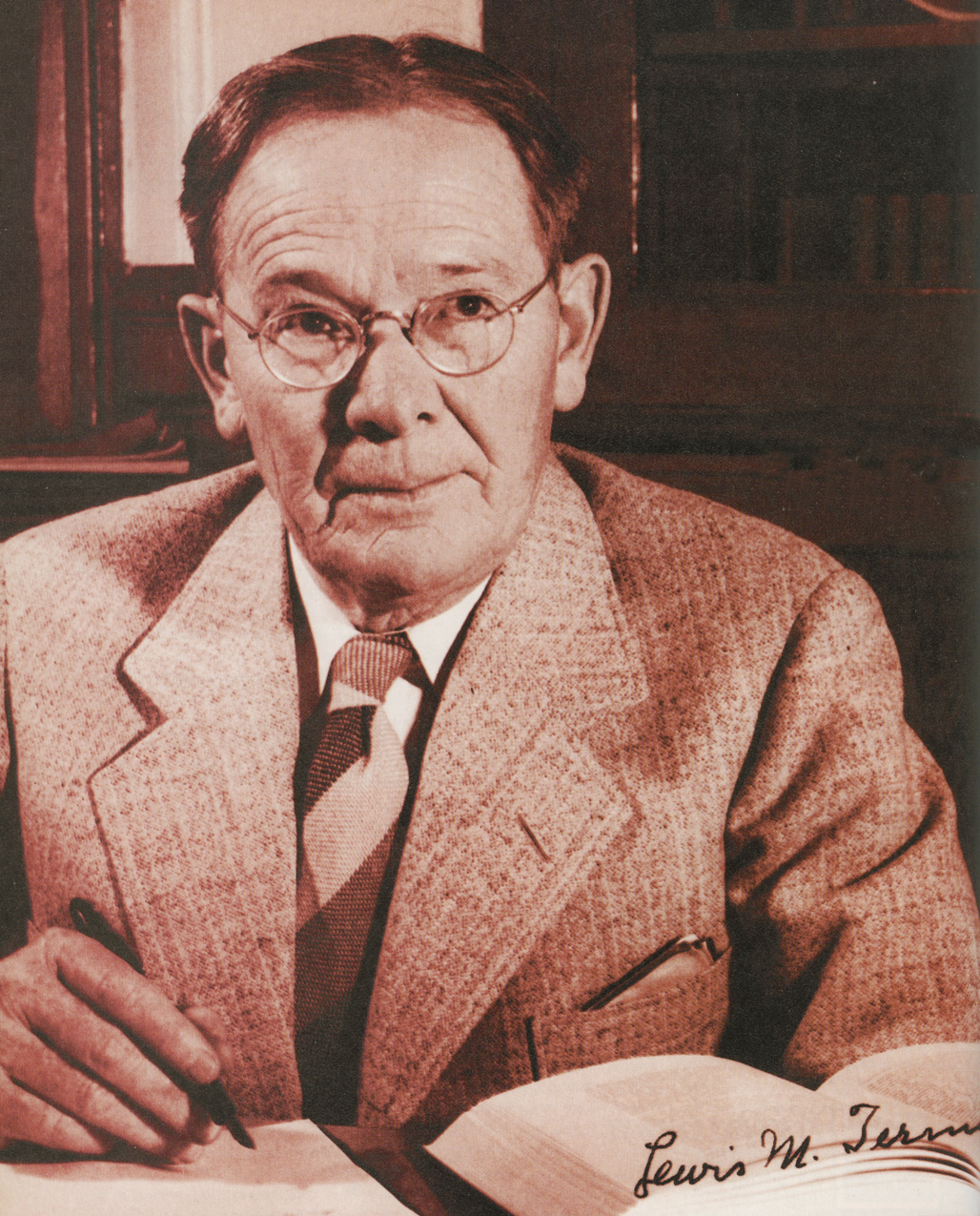
Terman’s Stanford-Binet revision
Terman advocated for widespread intelligence testing across America
1916, published a revised version of Binet’s test for Americans.
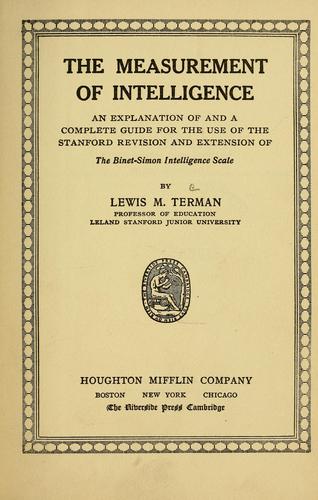
Terman’s eugenic motivations
it is safe to predict that in the near future intelligence tests will bring tens of thousands of these high-grade defectives under the surveillance and protection of society. This will ultimately result in curtailing the reproduction of feeble-mindedness and in the elimination of an enormous amount of crime, pauperism, and industrial inefficiency.
The number of children with very superior ability is approximately as great as the number of feeble-minded. The future welfare of the country hinges, in no small degree, upon the right education of these superior children.
Eugenical concerns about war
World war I had broken out in 1914…
Eugenicists were debating whether war would help or hurt the causes of eugenics
War could eliminate “unfit” people, but could be randomly killing “fit” and “unfit” people.
Eugenicists were interested in using mental tests in the war effort
American Psychologists in WWI
Yerkes, R. M. (1918). Psychology in relation to the war. Psychological Review, 25(2), 85–115. https://doi.org/10/dhdj4j
APA created several committees to determine how psychologists could help the war effort.
Many of them were committed to the eugenics movement, and one-time APA presidents, including Robert Yerkes, Madison Bentley, Edward Thorndike, John B. Watson, Walter D. Scott, Robert Woodworth, and Carl Seashore
The Alpha-Beta Test
Alpha-Beta tests involved mass testing of 1.75 million Americans
A “mental census” for the Army
Psychologist Robert M Yearkes (1876-1956)
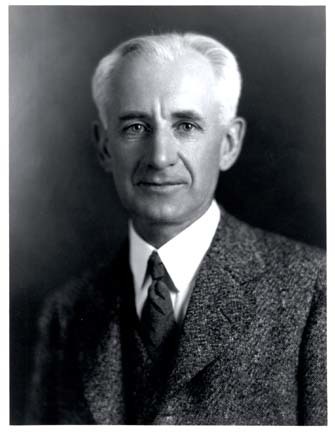
Examples
Alpha test was for literate soldiers
Beta test was for illiterate soldiers
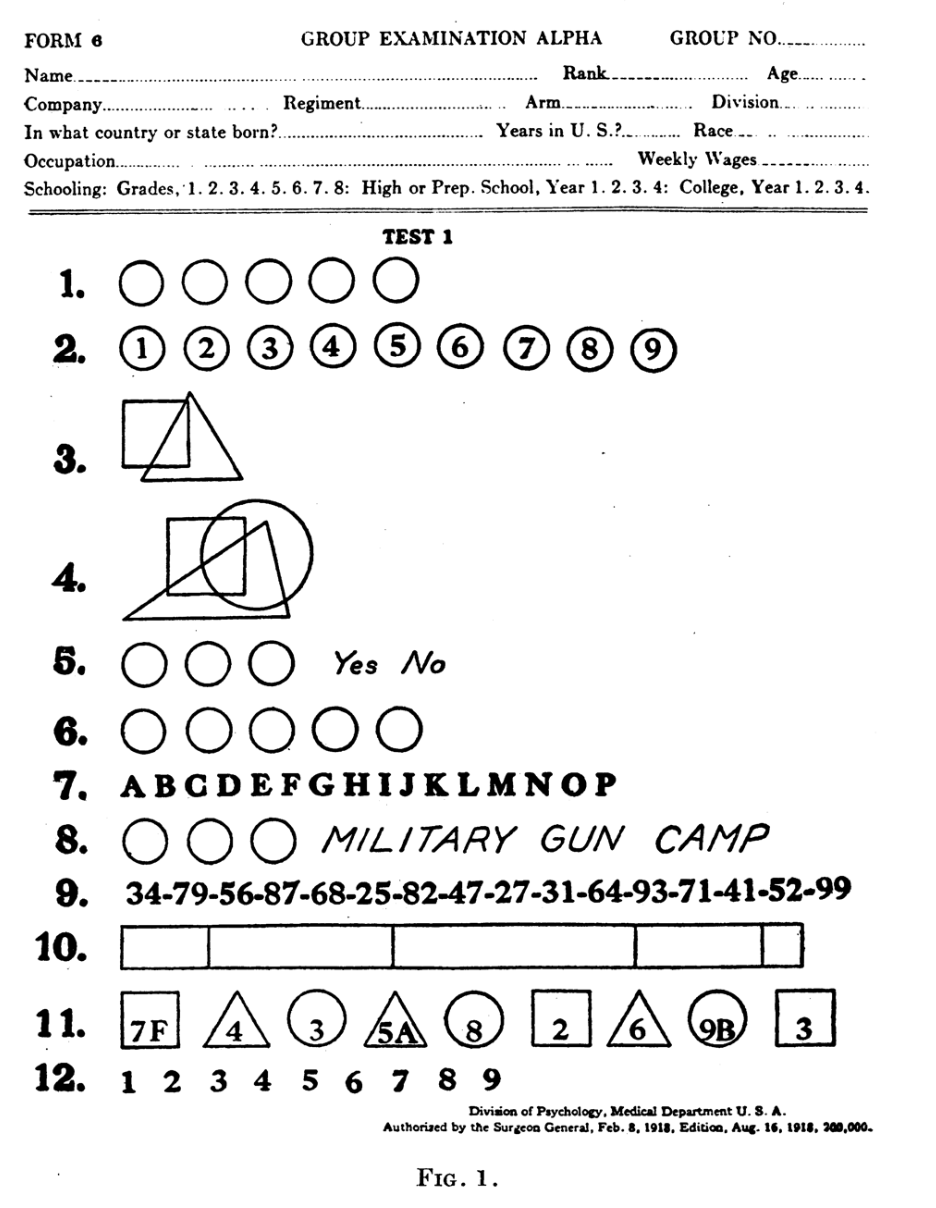
More Examples
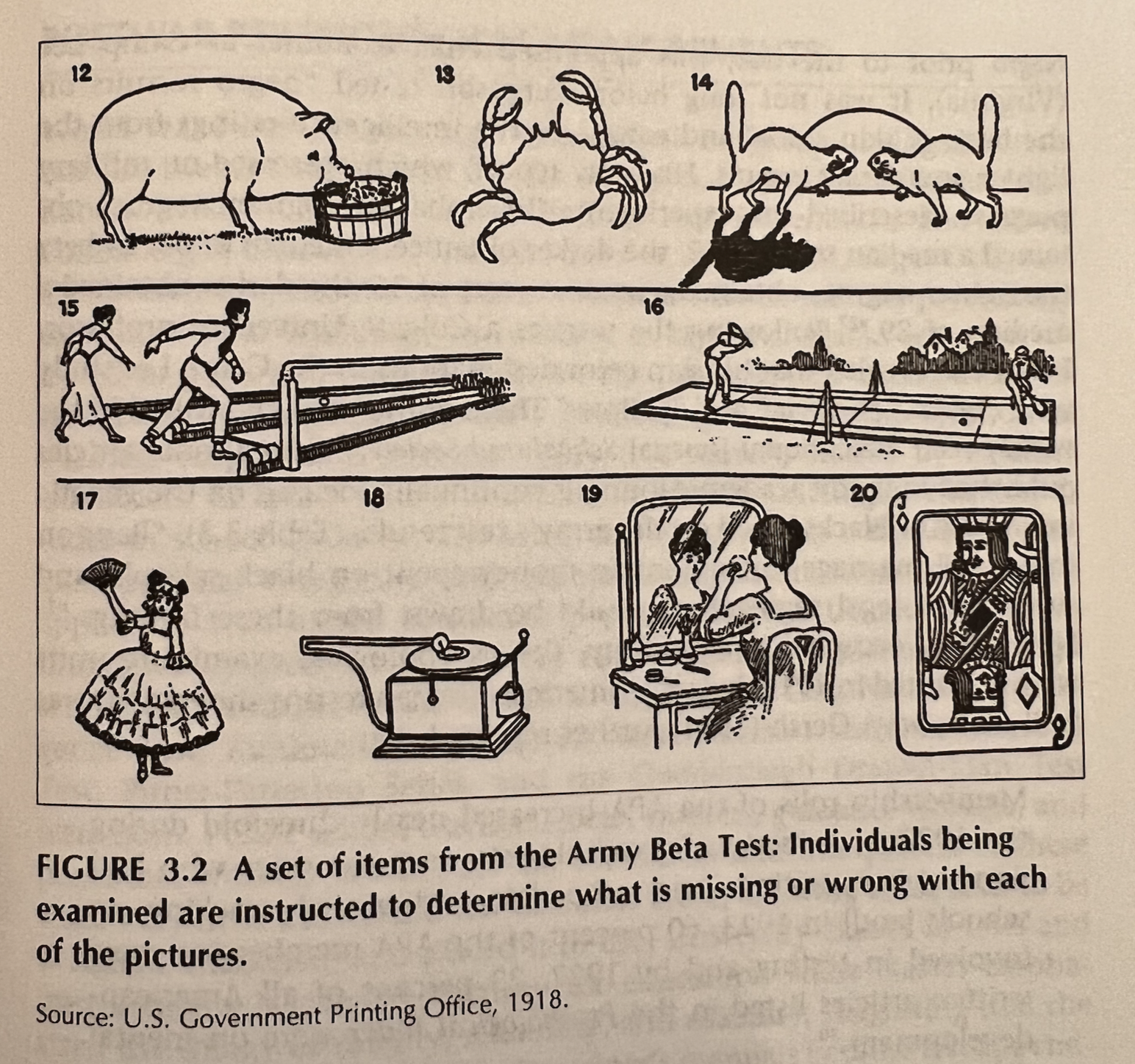
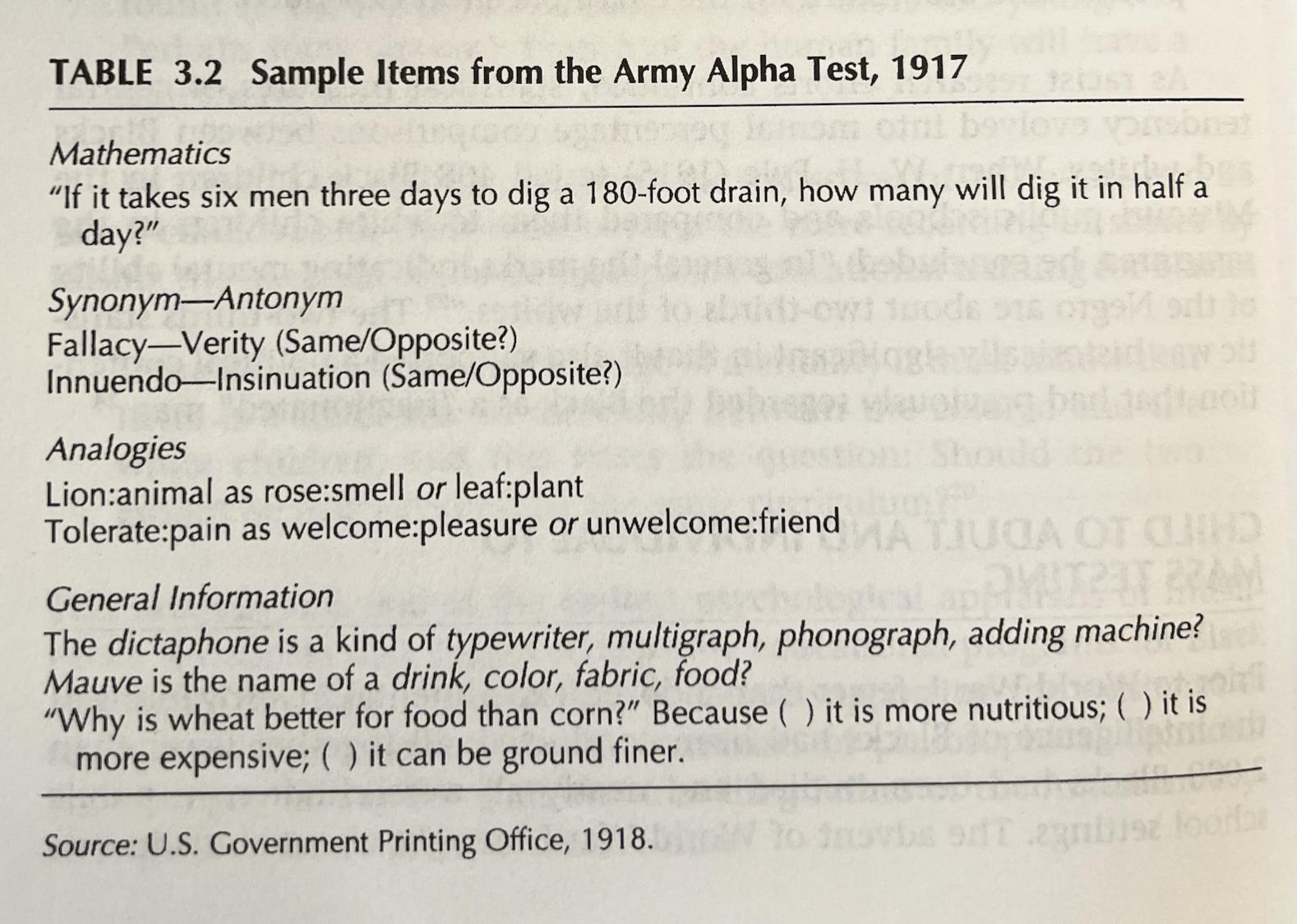
Racial bias
Yearkes argued the results showed that whites had superior intelligence compared to blacks and immigrants
Application and Interpretation
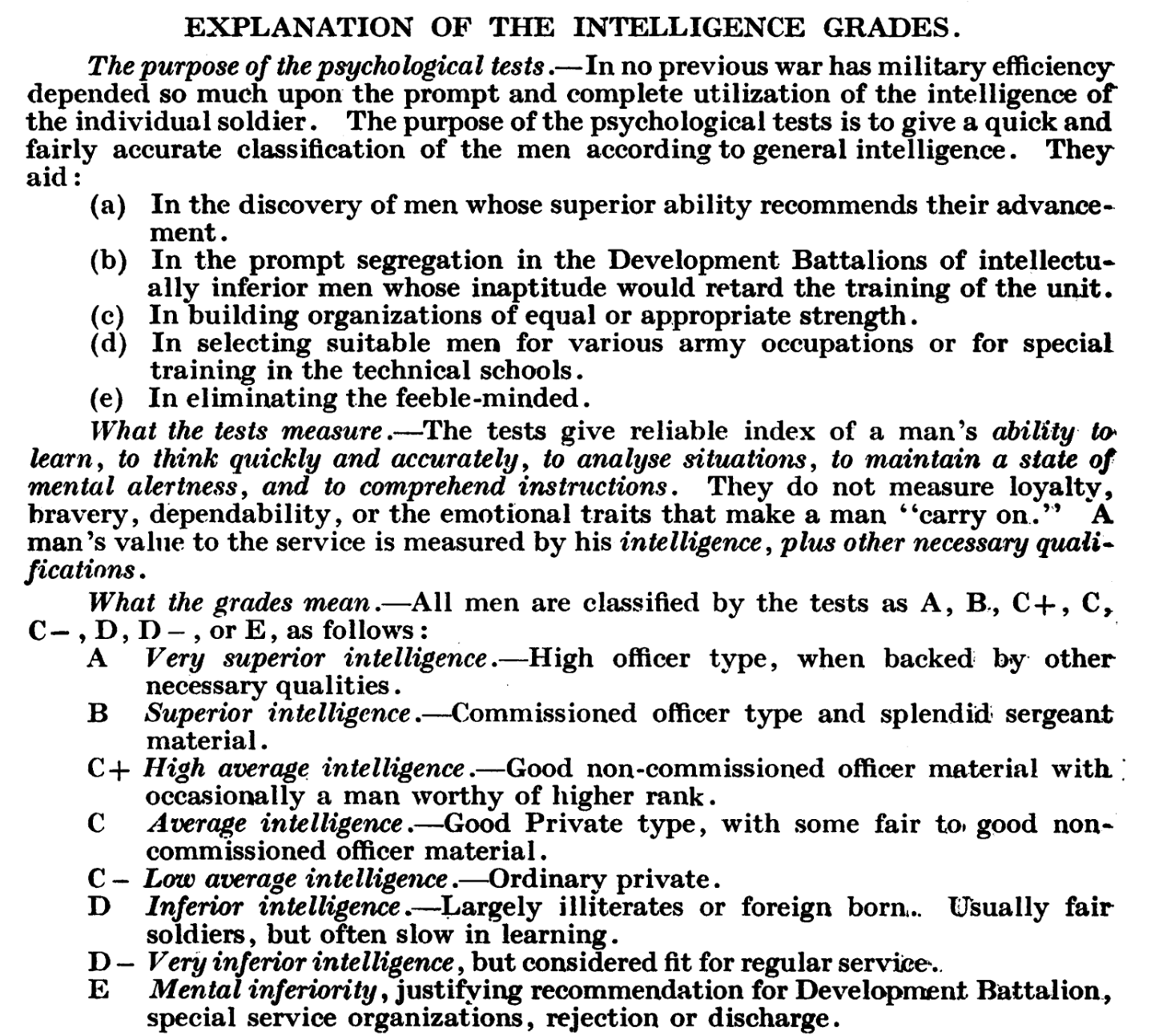
Scientific Racism
Carl Brigham popularized the alpha-beta army test results in his 1922 book
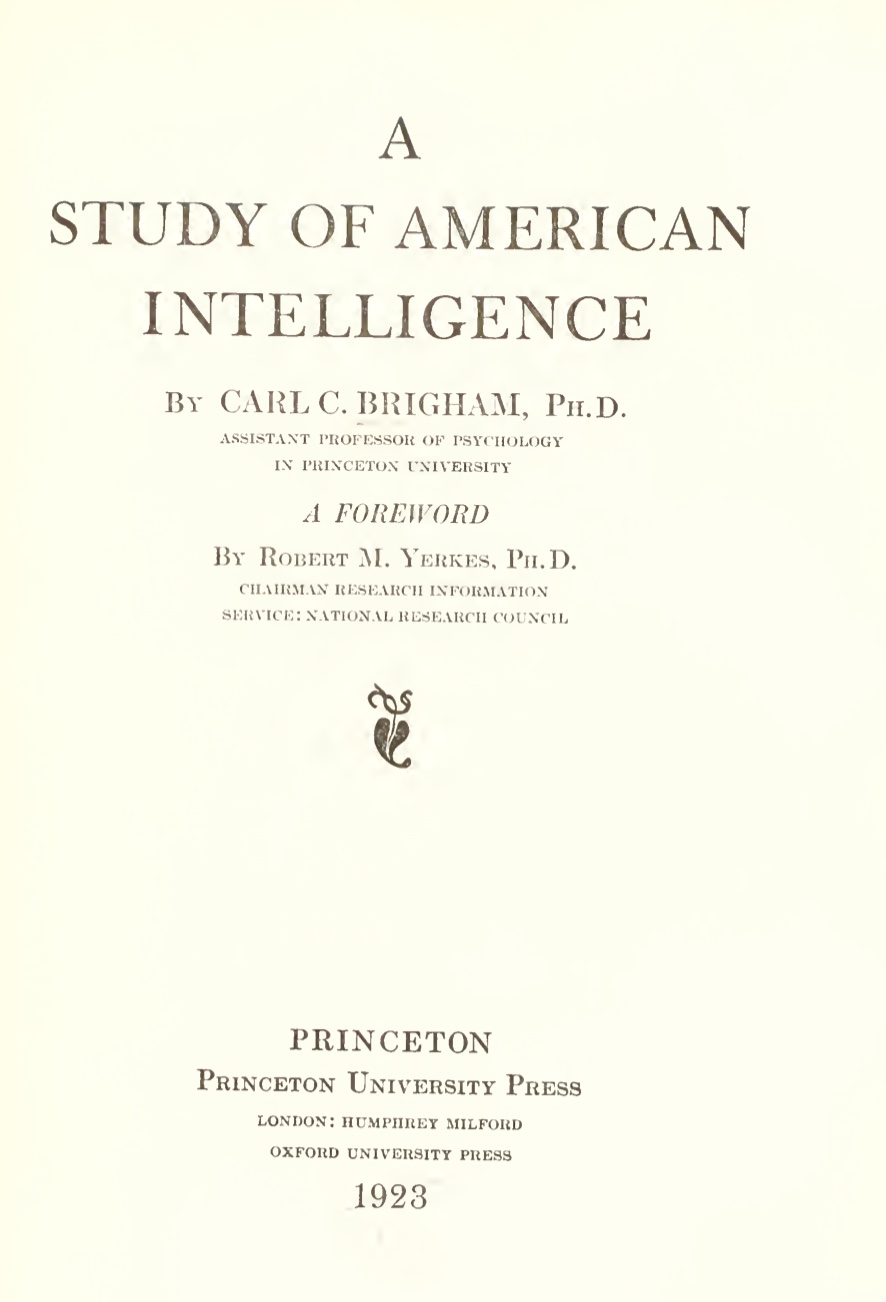
He furthered racist conceptions of intelligence
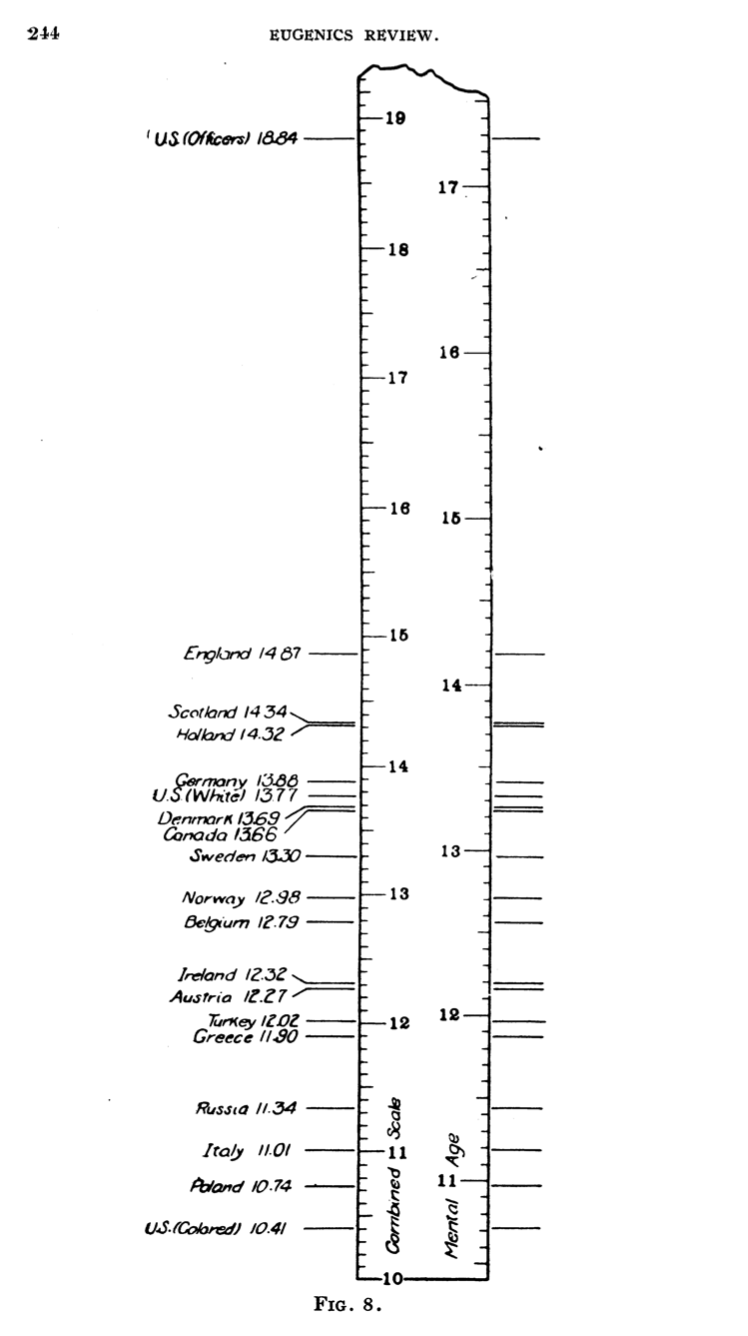
Continued racism
IQ testing and mental health
Eugenics proponents advocated that IQ tests be used to identify “feeble-minded” people that should be institutionalized by the state and/or involuntarily sterilized
Goddard’s “who is a moron?”
Goddard describes how “feeble-mindedness” should be split into categories based on IQ
idiot: mental age of two
imbecile: mental age of 3 to 7
moron: mental age of 8 to 12
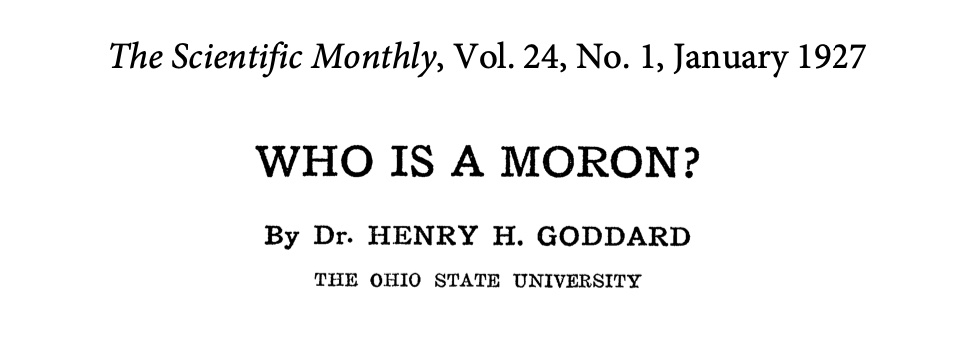
Goddard’s problem
Considers two general “solutions” to how society should deal with people identified as “morons” by IQ tests
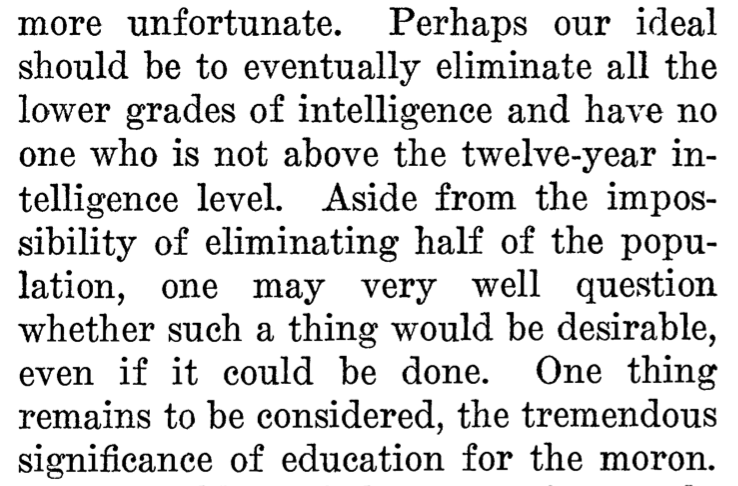
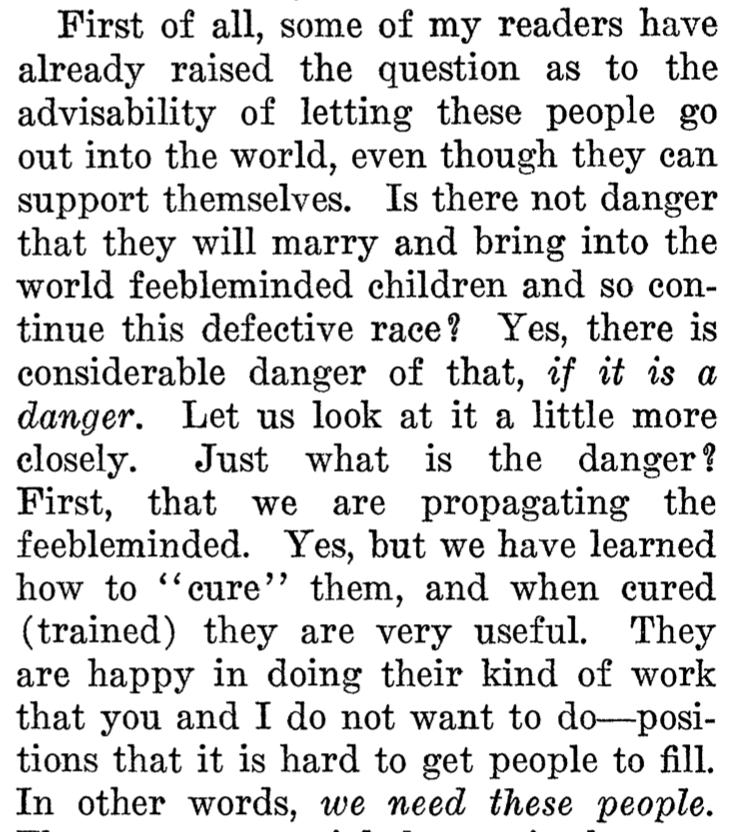
Roadmap
1 The intelligence test race
2 Binet-Simon Test
3 Mental testing and Eugenics
4 Critical responses
Critical Responses
Kamin, L. J. (1974). The science and politics of IQ. Psychology Press.
Hilliard, A. G. (1976). A Review of Leon Kamin’s The Science and Politics of I.Q. Journal of Black Psychology, 2(2), 64–74. https://doi.org/10/gg3hr5
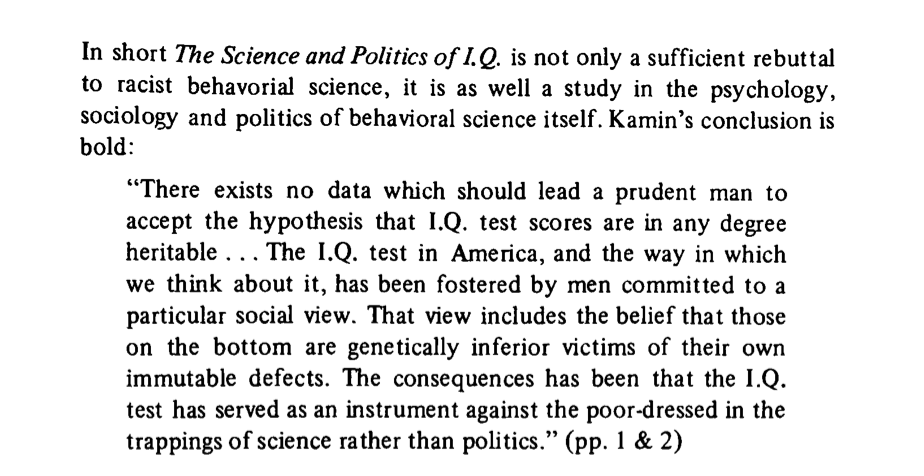
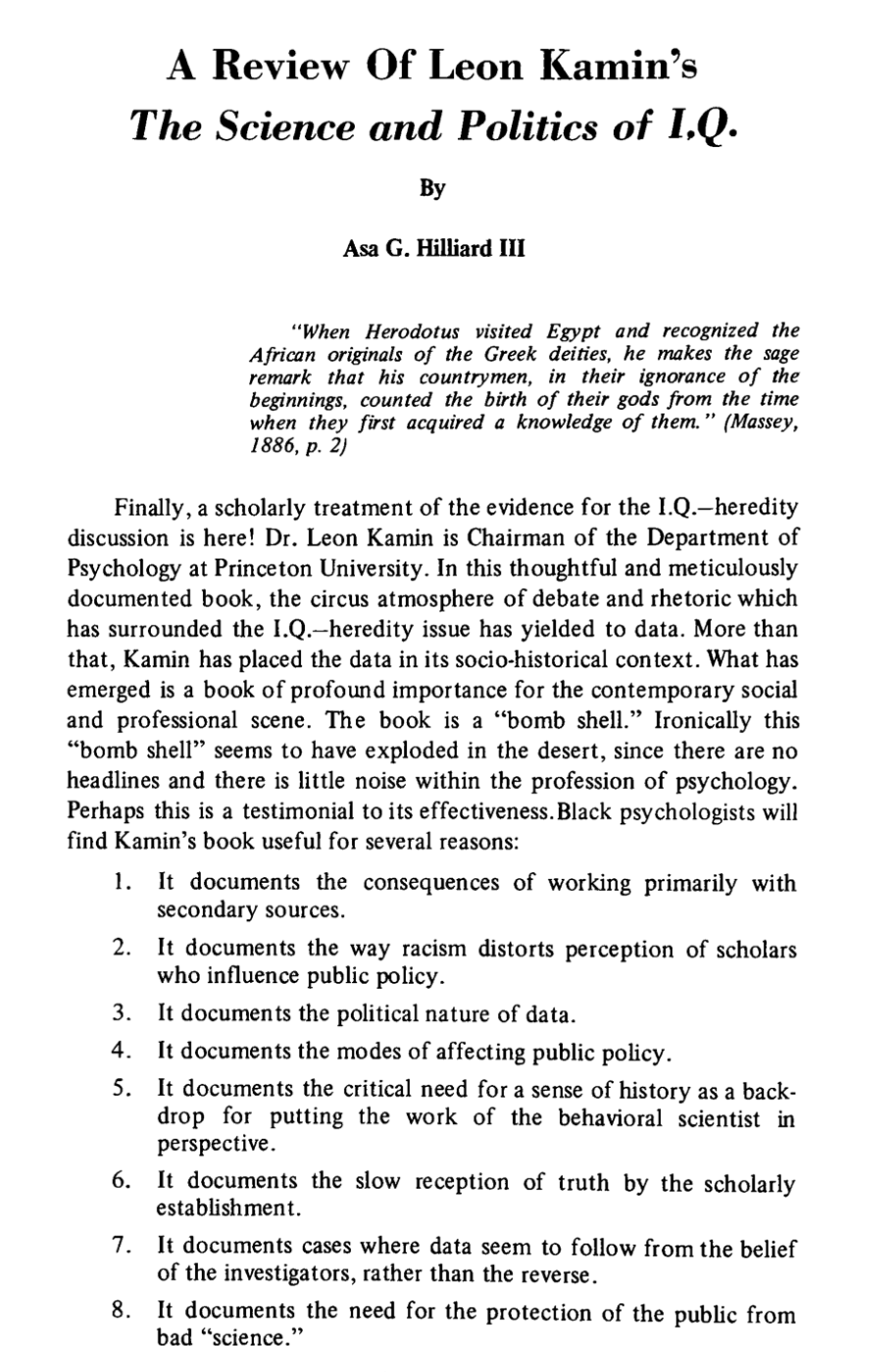
Black Psychologists in APA
Up through the 1960s, the APA was overwhelmingly white
In an APA meeting in 1968, a small group of Black Psychologists formed their own organization, ABPsi.
Williams, R. (1974). A History of the Association of Black Psychologists: Early Formation and Development. Journal of Black Psychology, 1(1), 9–24. https://doi.org/10/gg3hq4
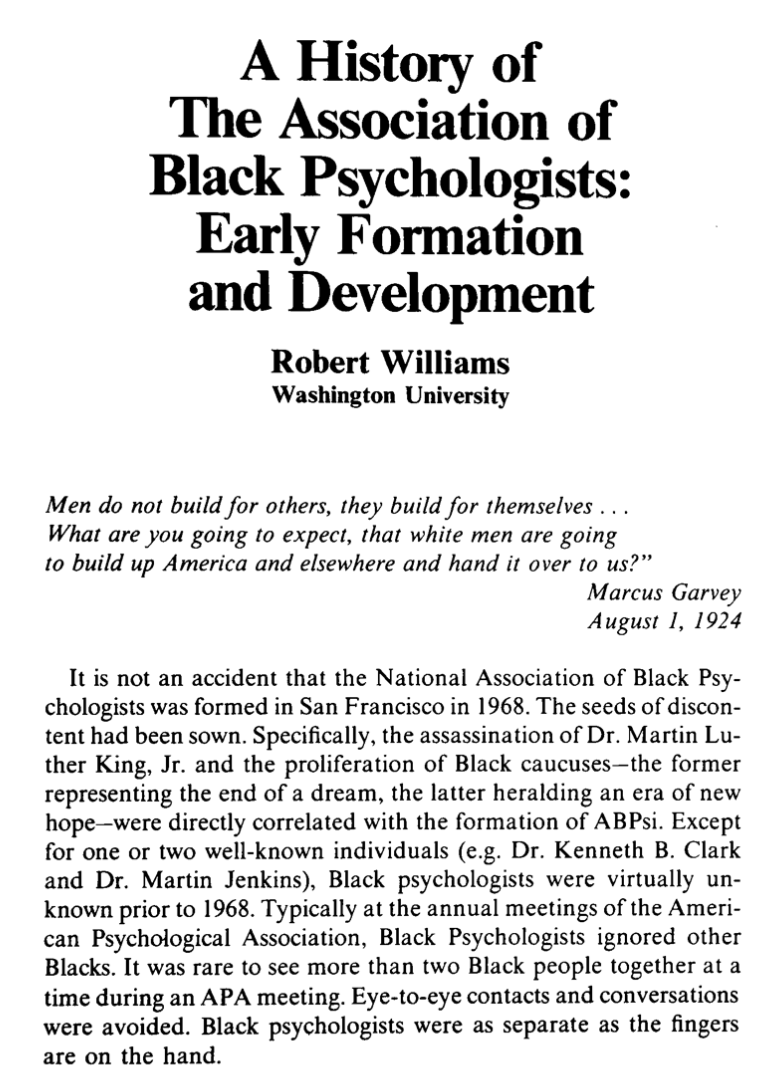
Moratorium on IQ testing of Black children
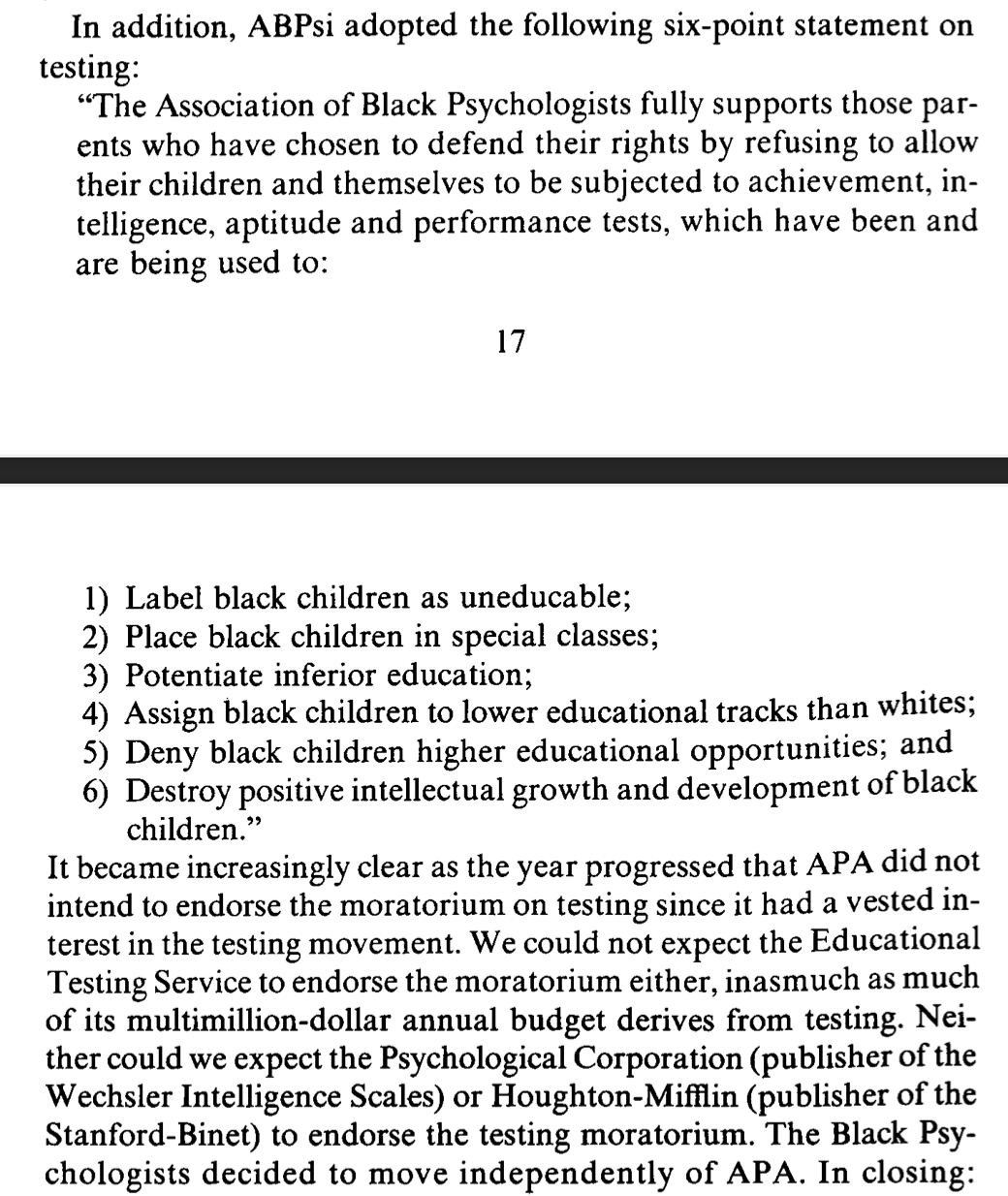
Outcomes
Advocacy of Black psychologists led to a moratorium on intelligence testing of Black children in California (1979), still in effect
There was also substantial pushback from groups with vested financial interests in intelligence testing
Williams, R. L., & Mitchell, H. (1978). What Happened to ABPsi’s Moratorium on Testing: A 1968 to 1977 Reminder. Journal of Black Psychology, 4(1–2), 25–42. https://doi.org/10/gg6btt
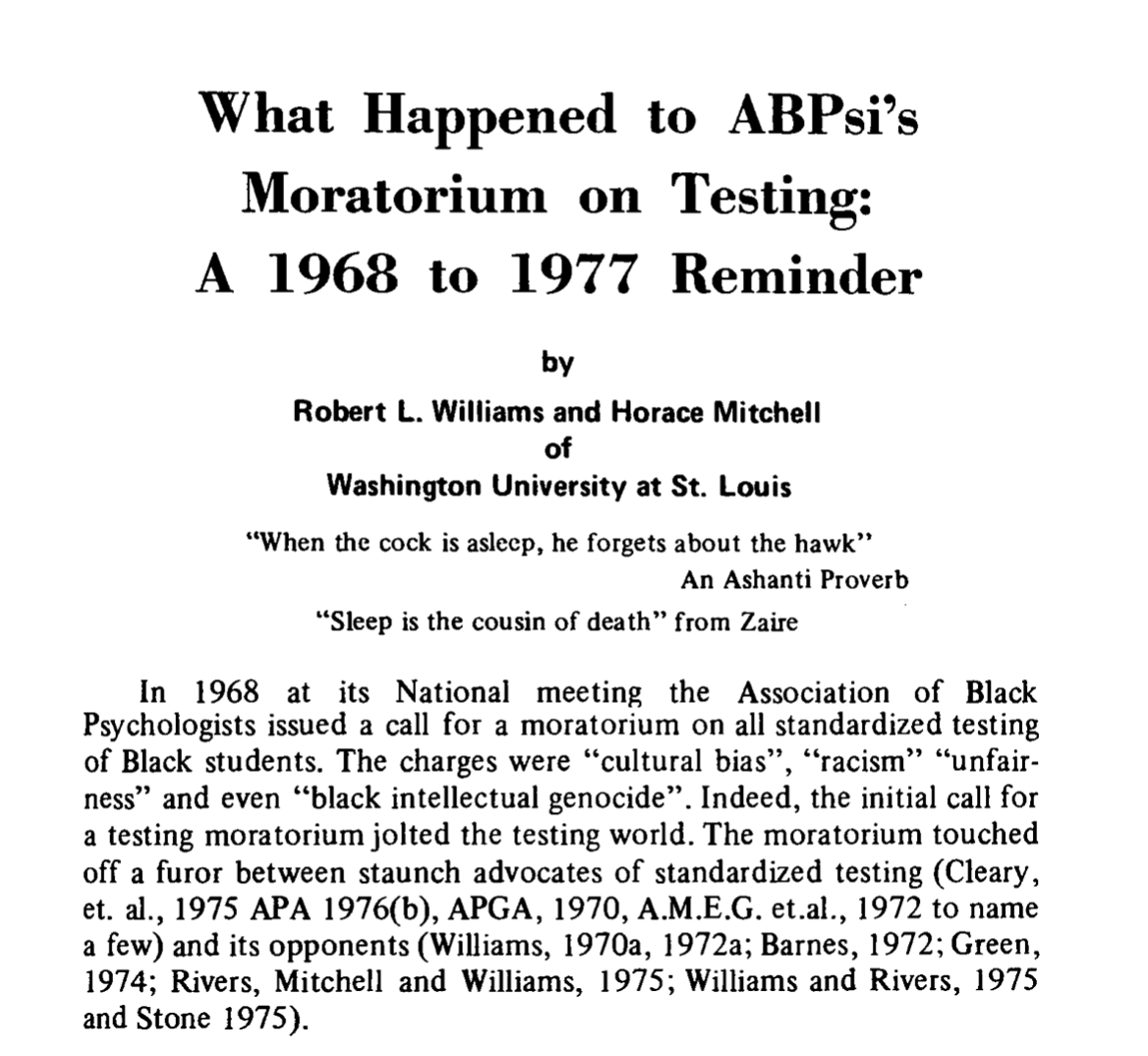
Further reading
The Journal of Black Psychology has published many excellent articles on intelligence testing and its impacts on society
Guthrie, Robert V. (1976, 2004 2nd ed.) “Even the Rat was White” A Historical View of Psychology.
What’s next
This is the last lecture for the psychology, eugenics, and intelligence testing learning module.
Your next step is to complete a quiz or assignment by the due date posted on blackboard.
The next learning module is on the topic of “associations”